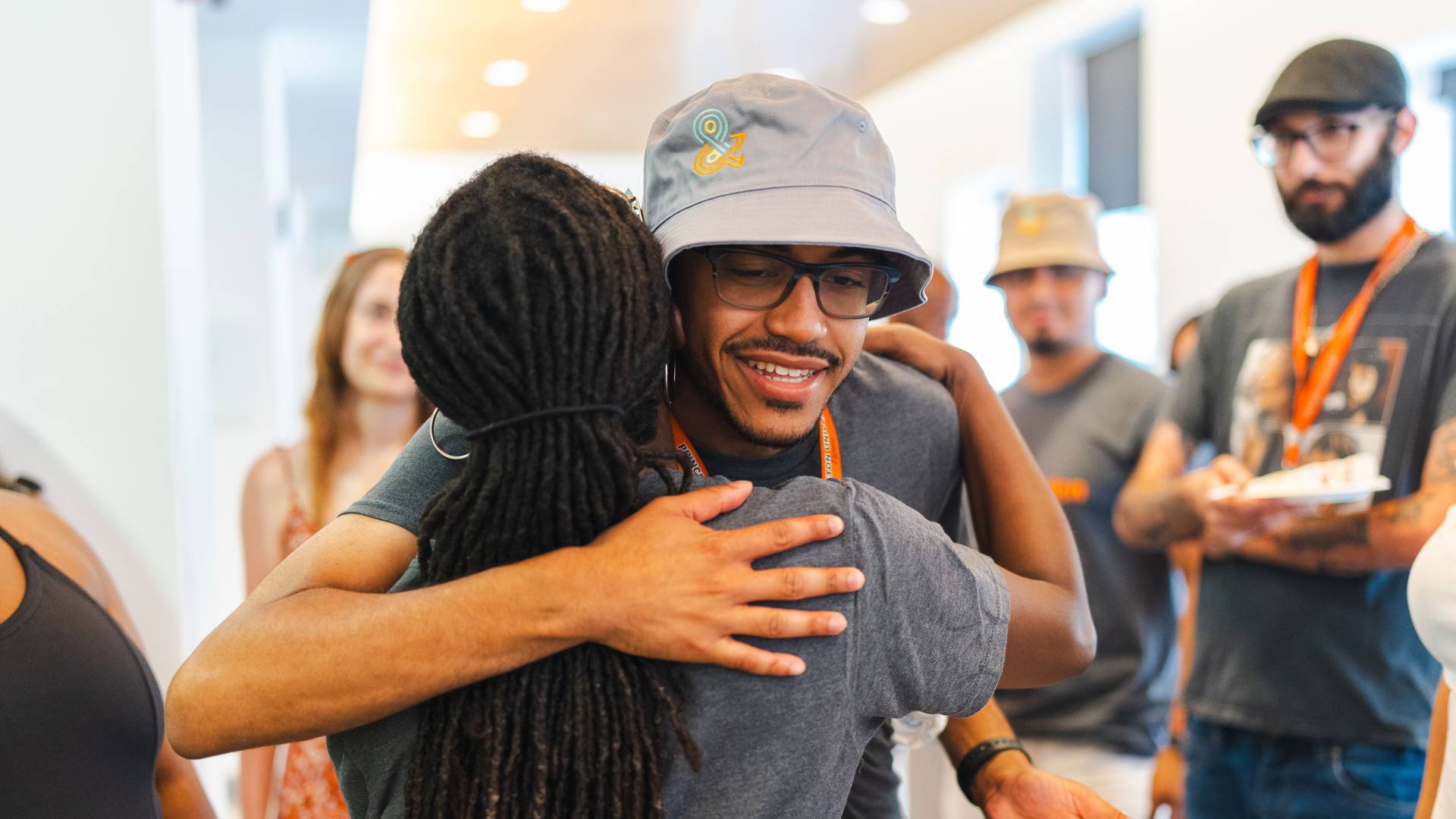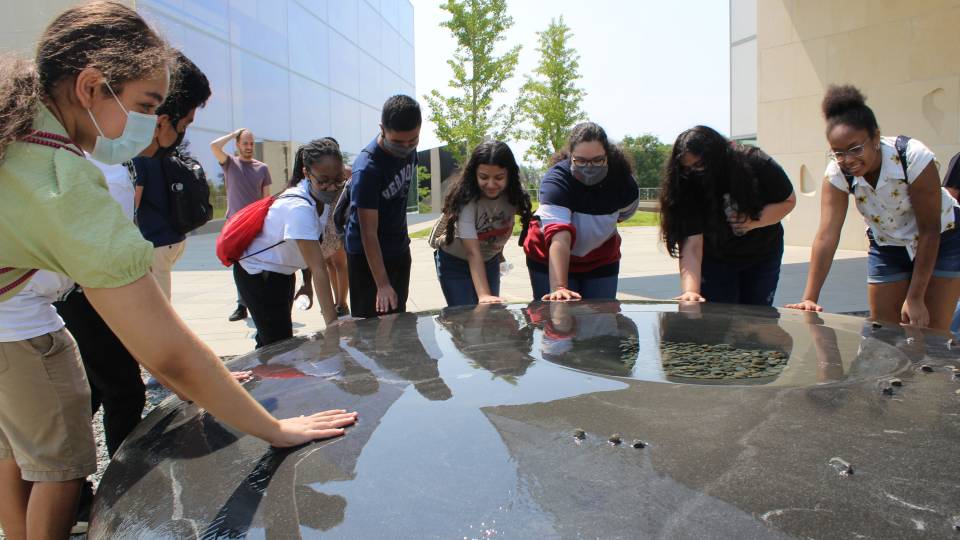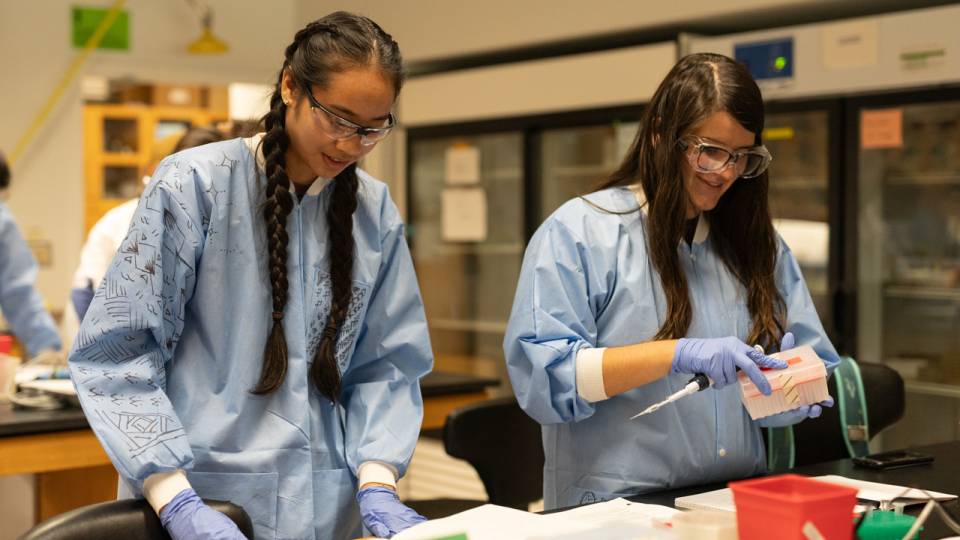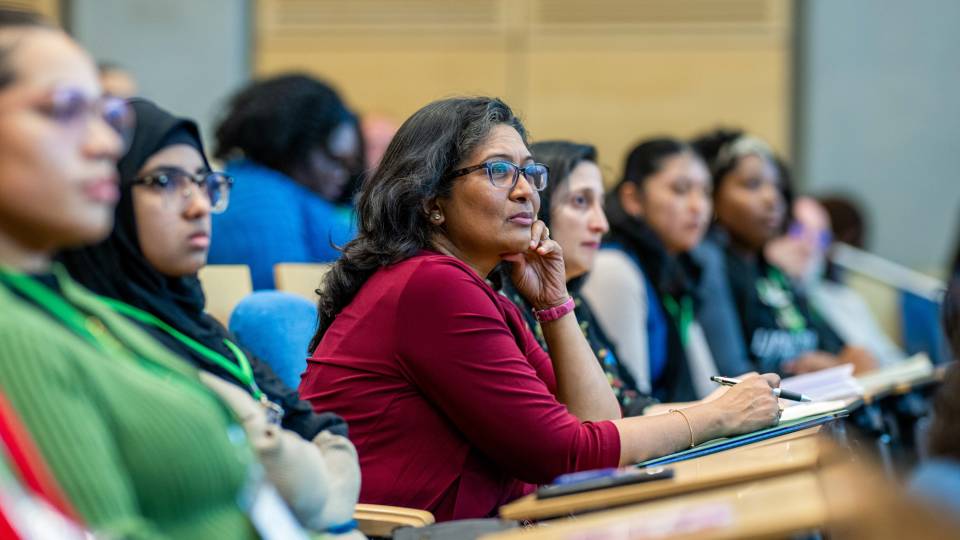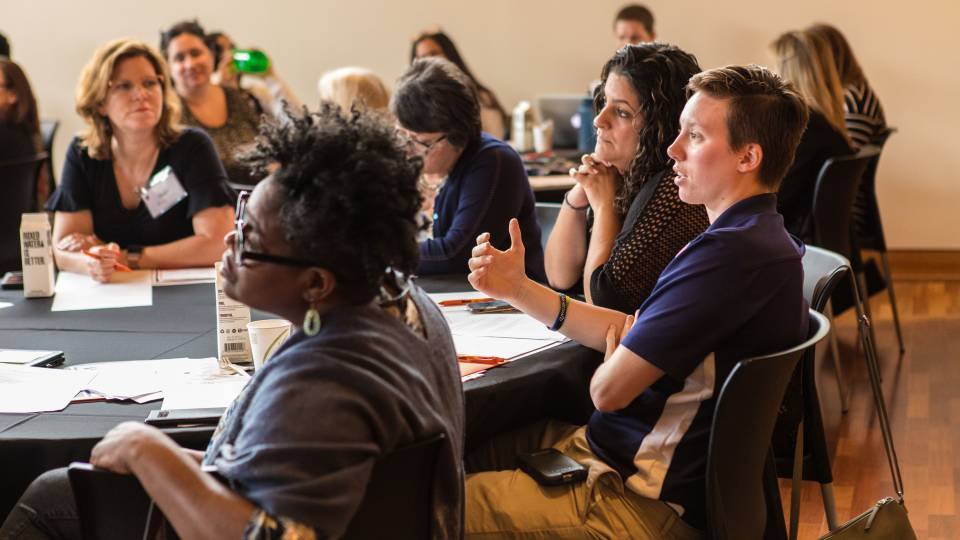The Aspiring Scholars and Professionals (ASAP) program helps prepare N.J. public and community college students for careers in higher education. Here, TCNJ student Donovan Crumpton (in hat) and Afia Ofori-Mensa from Princeton's Emma Bloomberg Center for Access and Opportunity, say their goodbyes at a closing event.
Approximately 400 high school, public college, first-generation, lower-income and transfer students will start this academic year with a boost following a summer spent with Princeton’s Emma Bloomberg Center for Access & Opportunity (EBCAO).
This year marked the center's largest summer yet, with distinct programs serving high school students from the local area and across the country, incoming Princeton first-years, and students from community colleges and public universities in New Jersey. The programs included: Aspiring Scholars and Professionals (ASAP), Freshman Scholars Institute (FSI), Princeton Summer Journalism Program (PSJP), Princeton University Preparatory Program (PUPP) and Transfer Scholars Initiative (TSI).
The Emma Bloomberg Center’s mission is to support all students — including those from first-generation college, lower-income, transfer, veteran and military backgrounds — in their academic journeys to, through and beyond college. The center offers robust programming to both University and non-Princeton students throughout the year.
“The summer months provide a dedicated opportunity to engage students in enrichment activities that help prepare them for the year ahead, including important milestones like applying and transitioning to college, selecting a major and preparing for graduate school and professional life,” said Khristina Gonzalez, associate dean of the college and the Bob Peck ’88 Director of the Emma Bloomberg Center for Access & Opportunity.
“EBCAO’s vision is that every student has the chance to imagine and fulfill expansive possibilities for their lives,” Gonzalez continued. “Our programs are therefore designed holistically, giving students the support that they need to define and achieve their individual academic, co-curricular and personal goals.”
In late July, the center held its first community-wide summer gathering to connect students across programs, screening the documentary “First Voice Generation” and hosting a talkback with filmmaker Cynthia Martinez.
“Programs like [those offered by] the Emma Bloomberg Center are trying to give you that access and opportunity to be exposed to new things,” Martinez said. “When you are in college, it’s really important to step out of your comfort zone and get to know people,” she added, encouraging students to especially make connections with their professors.
The learning and community-building of the summer will continue, with each program offering college counseling, academic support and/or professional mentorship in different ways during the school year.
Highlights from the Emma Bloomberg Center’s summer 2024 programs are below.
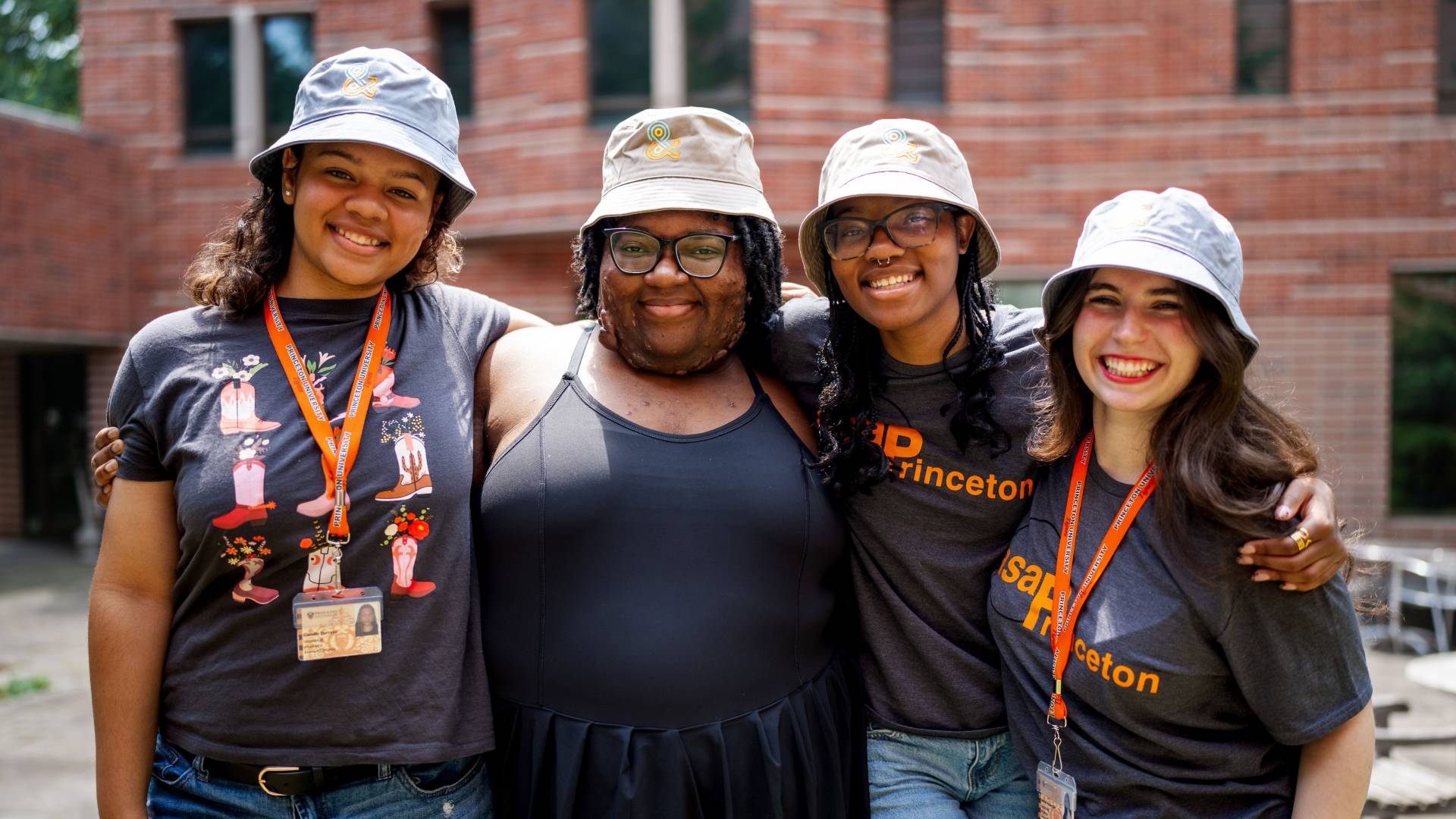
This academic year, ASAP piloted an option for students to extend their internships through the fall semester to continue working with their supervising mentors across a range of professional and research internships at the University. Left to right: Camille Burress, Dana Dillard, Ebony Riley, and Jackie Anderson.
Aspiring Scholars and Professionals
This summer, the Aspiring Scholars and Professionals (ASAP) program welcomed 19 undergraduates from New Jersey colleges and universities to participate in research and professional internships with Princeton faculty and staff mentors. This year marked the largest cohort since ASAP was established in 2021, with students representing community college and public higher education institutions across the state.
The eight-week program aims to prepare students interested in the humanities, social sciences, communications and education for possible careers in higher education. Internship hosts included the Office of the Dean for Research, the Princeton Neuroscience Institute, the Julis-Rabinowitz Center for Public Policy and Finance, and Princeton University Press.
The students “examine the possibility of entering, and thereby diversifying, careers in higher education," said Afia Ofori-Mensa, director of equitable postgraduate academic opportunity at the Emma Bloomberg Center.
This academic year, ASAP will pilot an option where students can extend their paid internships through the fall semester on a part-time basis. According to Ofori-Mensa, a majority of this year's cohort plans to continue working with their ASAP mentors.
“We decided to turn our attention toward creating a longer-term professional experience for the students,” Ofori-Mensa said. The goal is for students to become greater collaborators with their supervising mentors and build skills they can apply to their future careers, she added.
Alya Nassrallah, a member of Rutgers University-Newark’s Class of 2025, interned with the Princeton-Mellon Initiative in Architecture, Urbanism and the Humanities. After working on the initiative's annual report, Nassrallah said she came away with a more nuanced understanding of gentrification, something she said her family has experienced firsthand. Through ASAP, Nassrallah said she knows more about how to find a "middle ground" in redevelopment that improves community-wide access to amenities without displacing its longtime residents.
After graduation, she wants to become more involved with municipal issues in her hometown of Hoboken, work with social service organizations, and eventually pursue a Ph.D. in planning and public policy. She ultimately hopes to help build affordable housing and oversee innovative urban planning.
“I want to work in those areas when I graduate to have a systematic change. That is my call to public policy,” she said. "I truly believe that Princeton was that beginning," she added, "and now I'm ready to do the hands-on work to enforce it."
Students in ASAP can choose to live on campus or commute, dividing their time each week between the internship, workshops on professional development and research methods, mentor meetings, and candid conversations where Princeton faculty and staff discuss their career journeys. At the end of the program, each student explained what they learned during their internship and its role in shaping their future studies or professional path.
Jackie Anderson, a student in the Class of 2026 at The College of New Jersey, interned at Princeton's Office of Human Resources (HR) under Sonya Ponder, a diversity, equity and inclusion talent acquisition manager and first-time supervising mentor for ASAP. Anderson, who hopes to pursue a career in psychology, public policy or human resources, said she turned down three other jobs for ASAP, and called it “the best decision I ever made.”

Roger Fortunato, a student at Union College of Union County, New Jersey, works in a Princeton molecular biology laboratory as part of his summer with the Transfer Scholars Initiative.
Transfer Scholars Initiative
The newest of the Emma Bloomberg Center programs, the Transfer Scholars Initiative (TSI) continues to expand after a successful pilot in 2023. TSI is part of the University’s growing partnerships with New Jersey community colleges and is among new transfer programs focused solely on supporting non-Princeton students.
This year, 70 students attended the robust summer program that included writing seminars, science and engineering classes, college counseling and transfer success programs, and mentorship from Princeton faculty, staff and undergraduate course fellows. By the end, TSI participants earned a Princeton transcript with two credit-bearing courses eligible to transfer to their community college and eventual four-year transfer destination.
TSI students represented eight community college partners: Camden County College, Hudson County Community College, Middlesex College, Mercer County Community College, Raritan Valley Community College, Rowan College at Burlington County (TSI’s newest partner), Rowan College of South Jersey and Union College of Union County, New Jersey.
“In less than two months, TSI broadened my horizons more than ever before,” said Emily Smith from Camden County College. “It helped me determine what college would be a good fit for me, and also showed me the wide variety of options that many universities have to offer.”
TSI participants also had the option to live on campus, allowing them to experience residential life and connect with other students staying in the Princeton Summer Research and Learning Village. “Getting to have the full ‘college experience’ was very helpful in deciding what I want out of a four-year school,” Smith said.
Current Princeton transfer students also offered guidance and mentorship. During a candid panel discussion, Thomas Emens, Class of 2025 and president of the Princeton Transfer Association, shared his journey transferring from Middlesex County Community College as a first-generation college student.
“Admission staff will read your transcript and your resume, but those materials don’t fully answer the question of who you are and why you want to transition to a four-year institution,” Emens said. “Those are the things you want to explain in your application. I wanted admission staff to see the real me and what I’m passionate about.”
Students learned more about the transfer application process during in-person and virtual visits with admission officers from a variety of public and private universities, including Lehigh University, MIT, Muhlenberg College, Rutgers University, Princeton, The College of New Jersey, Wellesley College and Yale University.
“Financial aid is important to most students here and we learned about a lot of places that offer really good financial aid,” said Amira Merino of Mercer County Community College. “Now, I plan to apply to schools that I hadn’t even heard of before this summer.”
Keith Shaw, deputy director of the Emma Bloomberg Center, said program leaders also made sure to provide opportunities for fun and connection.
“Students appreciate that we’re attentive to their mental and emotional well-being. We put a great deal of energy into building a welcoming community,” Shaw said. “Taking two Ivy League courses at double-speed in the summer term is no joke, but the students are also having fun, both through our larger gatherings like the Grounds For Sculpture trip and through the friendships and smaller communities they’ve built for themselves.”
Barbara Boucke, also from Mercer County Community College, was among a handful of TSI participants balancing college and parenting. “We gave each other encouragement,” Boucke said. “I think the social connections are as important as the academic and transfer workshops and will last beyond the program. I’m so grateful to TSI.”
Following the summer session, TSI will continue to support students as they apply to transfer to four-year colleges and universities. TSI has already seen the success of members of its 2023 cohort, with students transferring this fall to schools including Drew University, Rutgers, The College of New Jersey, Princeton and Smith College.
“We’re excited to follow the trajectories of all our TSI-ers,” Shaw said. “These are great people who we are proud to work with.”
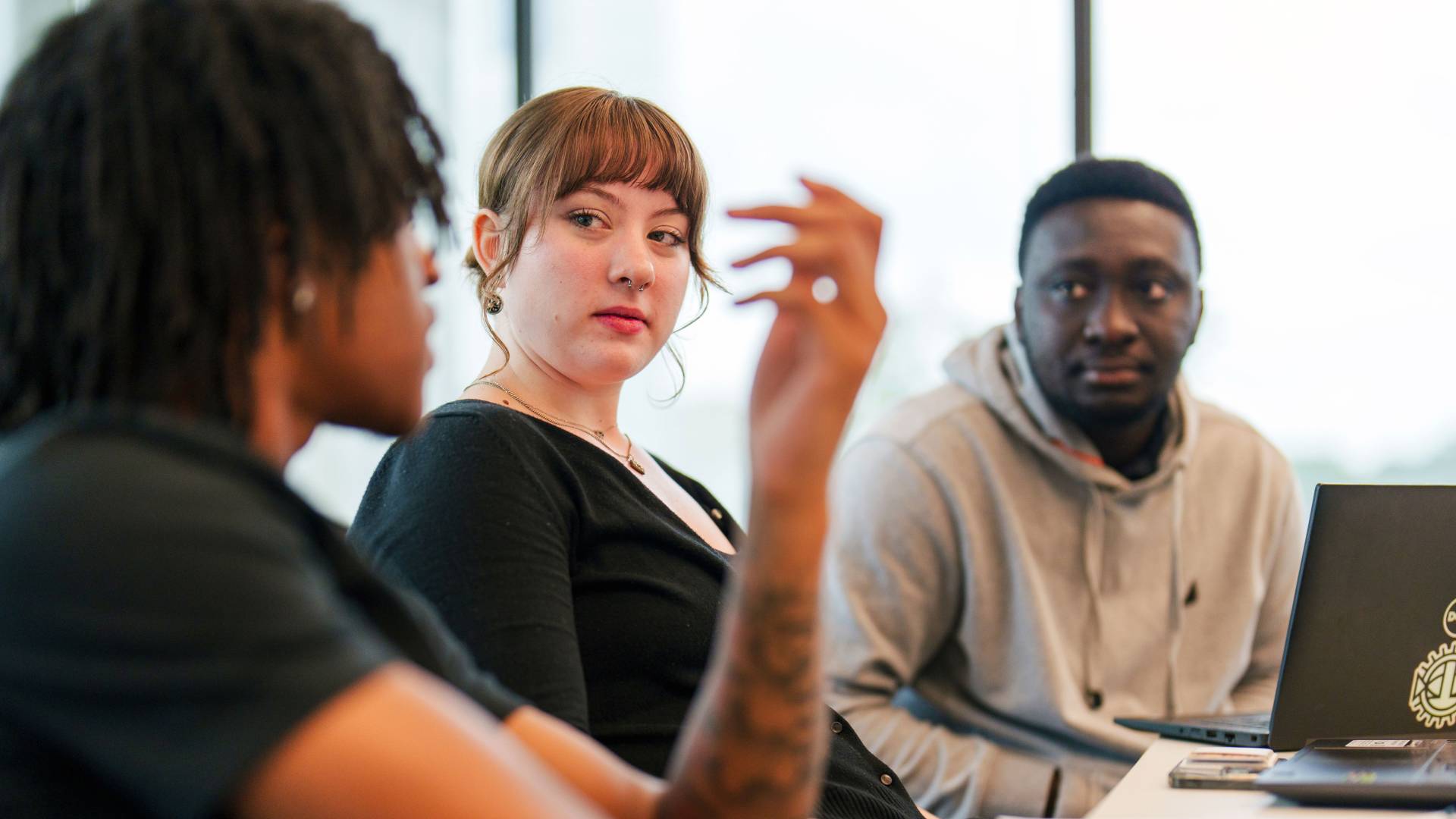
Princeton first-years (left to right) Kenneth "Kenny" Jordan, Lillian White and Jeffrey Asiedu-Braku discuss their reading assignment during a Freshman Scholars Institute (FSI) class. All FSI students take the "Ways of Knowing" seminar, which provides an introduction to scholarly thinking, reading and writing.
FSI Residential and Online
The Freshman Scholars Institute (FSI) offers a campus and online program for incoming Princeton students to experience academic, co-curricular and social life prior to the start of the fall semester. In 2024, 65 students attended FSI Residential and over 130 participated in FSI Online.
“By experiencing early the many resources that Princeton has to offer, our FSI students have the chance to set their goals, to prepare themselves to be peer mentors, and to take their place on campus as future leaders,” Gonzalez said.
Both the in-person and virtual experience offer students the opportunity to earn one or two Princeton class credits, learn from Princeton faculty, become familiar with the University’s many academic and well-being resources, and build community and friendships.
“FSI Online has already given me such an intricate understanding of Princeton, it's almost like I've been here before with all that I've learned,” said Keeven Giddens, a first-year transfer student and veteran who recently arrived from San Diego.
First-year Felicia Wijaya said FSI made her feel confident about transitioning to Princeton from her home in Jakarta, Indonesia.
“I'm glad to say that I've made friends with a lot of people at FSI Online, and I developed connections with some of the staff and faculty members even before I stepped foot on to campus,” she said.
Dean of the College Michael Gordin, the Rosengarten Professor of Modern and Contemporary History, was among the faculty who shared their research and scholarship with students during weekly academic colloquiums.
An expert on the history of science, Gordin discussed his book “On the Fringe: Where Science Meets Pseudoscience.”
“It is a really hard problem to decide what counts as science and what counts as pseudoscience,” he said. “Understanding why it’s hard is an interesting tour of multiple disciplines – the humanities, the sciences, philosophy.”
These questions can also apply more broadly, he noted. “The goal of a university is about distinguishing between credible and non-credible knowledge – that is why you are here,” Gordin told students.
Students honed those analytical skills in classes and co-curricular activities. All FSI students take the for-credit humanities class “Ways of Knowing.” The course is split into small sections — both in person and online — to expose students to the discussion-based seminars integral to the Princeton academic experience.
During one session, Soo-Young Kim, a lecturer in the Princeton Writing Program who also teaches in Hellenic Studies, led a conversation about Gloria Anzaldúa’s 1987 volume of poems and essays “Borderlands/La Frontera.” Kim asked the nine students to consider questions related to language, identity and activism.
“The text talks about how little options there are for women. She didn’t like how her culture tried to limit her,” said first-year Kenneth (Kenny) Jordan.
“You are absolutely right that she doesn’t like the way her culture limits her, but she still feels a connection to her culture,” Kim said. “It’s a much more nuanced and realistic picture. … We can be proud of our heritage, but we can also call it out.”
Giddens said his own “Ways of Knowing” course provided the tools needed for his fall writing seminar. “I feel like I can absolutely excel at thinking like a scholar and that I can handle the course rigor of Princeton,” he said.
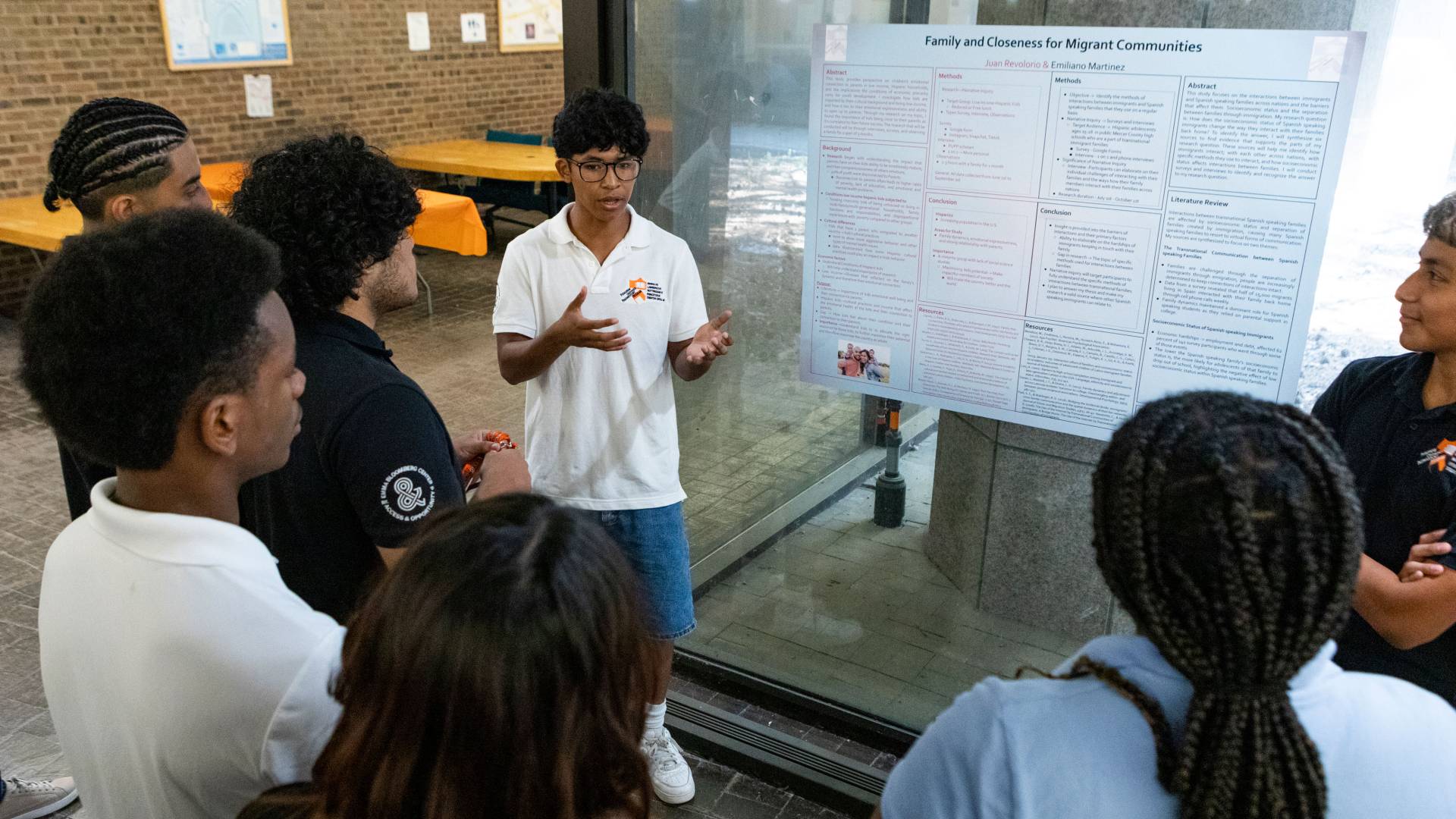
Juan Revolorio, a junior at Lawrence High School, presents his project titled "Family and Closeness for Migrant Communities" during the Princeton University Preparatory Program's summer research symposium.
Princeton University Preparatory Program
The PUPP Summer Institute is an integral part of the year-round college preparatory program for local high school students from Ewing, Hamilton, Lawrence Township, Princeton and Trenton.
The tuition-free program is aimed at nurturing both the educational and personal development of its students, who come from lower-income backgrounds and will be among the first in their families to attend college.
During the 2024 summer session, 72 sophomores, juniors and seniors completed classes in writing, literature, math, science and art. They attended college preparation courses, toured campuses and met with admission representatives, in addition to participating in cultural and arts enrichment along with wellness and personal development activities. They will continue working with PUPP during the school year and in future summers.
More than 500 students have completed PUPP since it was founded in 2001. PUPP alumni have earned undergraduate and advanced degrees at highly selective colleges and universities across the country, and they often return to serve as PUPP faculty, undergraduate teaching assistants and college admission counselors.
“Without PUPP’s support, I don’t think I would have gone on to college to be quite honest,” said Barbara Gruszka, who graduated from Princeton in 2020 and is now pursuing a doctoral degree in neuroscience at Rutgers University. Gruszka co-taught this summer’s neuroscience and psychology course.
Another PUPP alumnus, Michael Ortiz Castro, co-taught the social science research and writing course. “PUPP was my first time writing a sociology paper, my first time doing a dissection in a lab,” Ortiz Castro said. “It’s a good way of exposing high school students to new things and also exposing them to a higher level of rigor and expectation. And the students always rise to the challenge.”
Ortiz Castro graduated from Wesleyan in 2017 and recently completed his Ph.D. in American studies at Harvard. “PUPP was there every step of the way,” he said. “The PUPP administration led by Dr. Jason Klugman really supported me throughout my whole journey from high school, college and beyond.”
Klugman, the longtime director of PUPP, said the program is about supporting the whole student to ensure they not only gain admission to college but succeed in their studies and careers in the years beyond.
PUPP has expanded its program over the years to include cultural and arts activities that connect with students’ academic work. This summer’s thematic focus was the social, cultural and political history of Haiti. Students read books by the Haitian American author Edwidge Danticat, attended a workshop on the Haitian Creole language led by two PUPP faculty members with Haitian backgrounds, and enjoyed a festive Haitian luncheon.
The summer culminated with the annual PUPP Research Symposium, where students presented original research projects connected to their classes in psychology, sociology and the natural sciences. Research topics included sensory perception, biodegradable plastics and religion in immigrant communities.
“I’ve never done a research project to this scale before,” said Juan Revolorio, a junior at Lawrence High School. “I know college includes writing a lot of papers. I feel so prepared now and like I have that step ahead of other students in high school.”
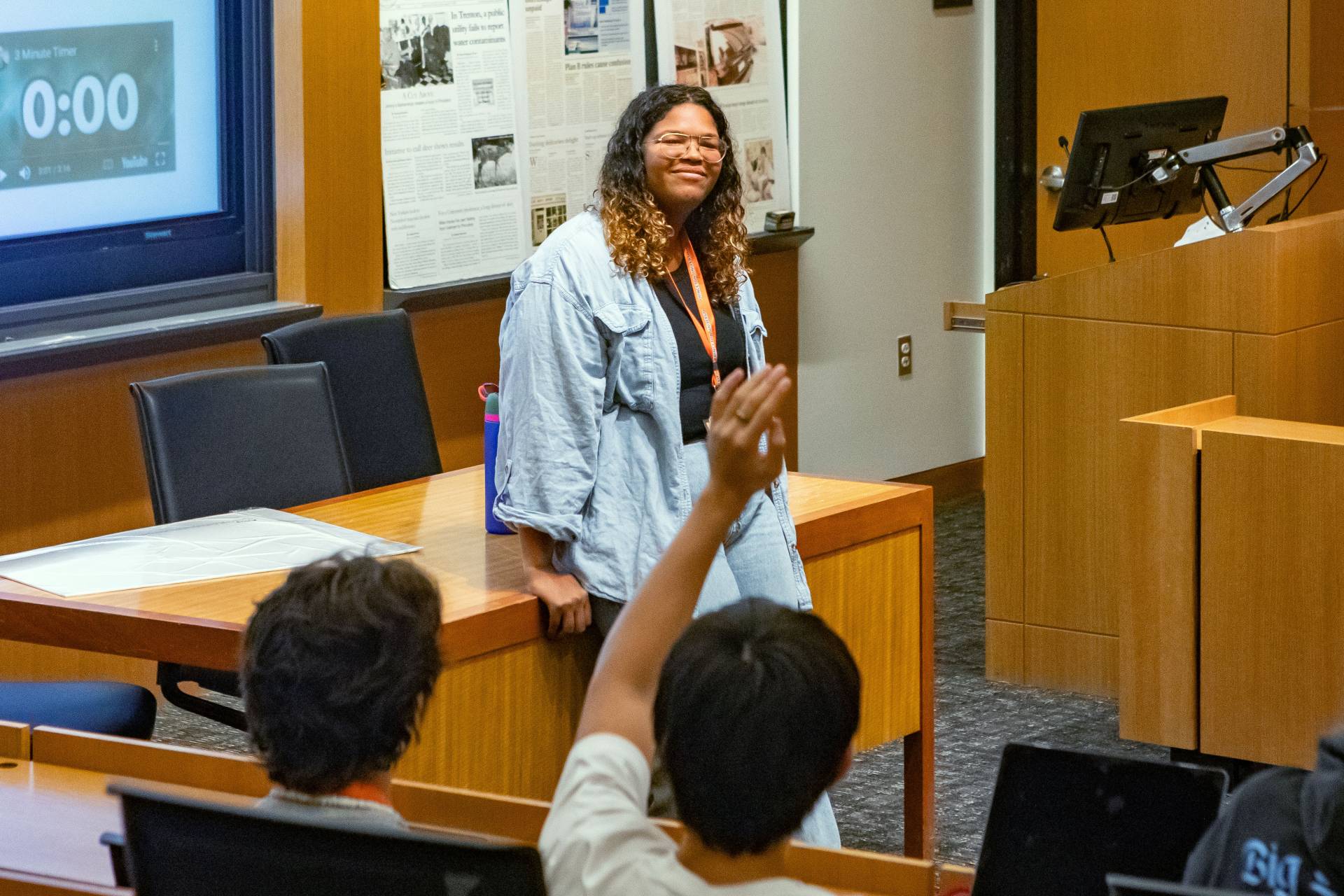
Eve Washington, graphics and multimedia editor for The New York Times section The Upshot, emphasized how data visualization captures “real experiences” that complement traditional storytelling during a Princeton Summer Journalism Program (PSJP) workshop on "Computational Journalism." Washington also served as a PSJP summer and college counselor.
Princeton Summer Journalism Program
Now in its 23rd year, the Princeton Summer Journalism Program brought 35 high school juniors from low-income backgrounds to Princeton's campus to gain insights on journalism, public service and democracy while also learning how to prepare for college.
Starting in the summer and into the school year, PSJP students also work one-on-one with a PSJP counselor, who offers mentorship and guidance through the college application and admissions process.
Nearly 650 students have participated in PSJP since it was founded in 2002. Some alumni have pursued careers as journalists, while others became authors, doctors, lawyers, politicians, educators and publishers.
Tieisha Tift, who co-leads PSJP in her role as assistant director for college preparation initiatives at the Emma Bloomberg Center, said participants of the 2023 program have been accepted to colleges and universities across the country, including Brown, Columbia, Duke, Princeton and UCLA.
This year marked the second time that PSJP was offered in a hybrid format. Students spent four weeks in expanded virtual programming before coming to Princeton in late July for the annual 10-day journalism boot camp. Both online and in person, students participated in lectures and workshops with professional journalists, received personalized mentorship from summer and college counselors, and reported on a broad range of topics connecting them to current events.
Once on campus, the students — who traveled from 12 states and Washington, D.C. — continued building the community they had established online. Megan Greenwell, who co-leads PSJP in her role as deputy director and has been a counselor since 2015, said each year she looks forward to working with such talented young people. “To see students blossom when the world is put in front of them is just such a delightful thing,” Greenwell said.
At the end of the program, the students publish their reporting in the Princeton Summer Journal, with this year’s cohort covering topics ranging from climate change to book banning.
Josiah Lee Johnson of New York, who was initially interested in a career in corporate law, said that PSJP has since "shed a light on journalism" to illuminate how he can use that same passion for advocacy as an investigative reporter.
Sophia Goldblatt of La Habra, California, said that the program’s encouragement to explore all types of journalism gave her a feeling of “freedom” that empowered her to become more confident in her writing.
“I really wanted a space to grow on my own as a journalist and just reach out and go to a place where I've never been before,” she said, noting that PSJP exposed students to award-winning reporters, took them to New York City to visit media outlets including Bloomberg and New York Magazine, and supported their journeys as reporters and writers.
In a workshop on "Computational Journalism," Eve Washington, graphics and multimedia editor for The New York Times section The Upshot, emphasized how data visualization engages readers while expanding on the interactivity of traditional storytelling.
"Data can be romantic. Data can be a human-interest story. Data can be funny. Data can be fascinating,” Washington said. “Data — just by virtue that it's numbers — … doesn't mean it's just facts," she said. "There's a lot of culture; there's a lot of real experiences captured in those numbers."
Goldblatt said it was inspiring to learn directly from professionals in the field.
“With every speaker that comes in, I'm just realizing how much of an impact on the world that I could have if I really dedicated myself to this,” Goldblatt said.

Princeton Summer Journalism Program (PSJP) students Nicole Aguilar, left, and Leslie Rueda Revilla, right, smile during a writing session where program participants worked on their reporting assignments for the Princeton Summer Journal. PSJP participants come from high schools across the country.
